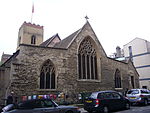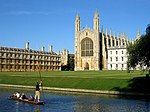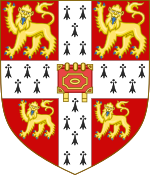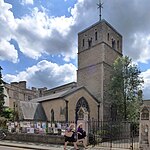St Edward's Passage

St Edward's Passage, known in the 18th century as Chain Lane, is a Y-shaped alleyway in Cambridge, England, between King's Parade—opposite the main gate of King's College—and Peas Hill. It houses the entrance and churchyard of the Church of St Edward King and Martyr; the Cambridge Arts Theatre; several cottages; G. David, an independent bookshop run from the same building since 1896; a few businesses; and student accommodation. It is a narrow, dark lane, with riven-stone paving, which opens out onto the much wider and sunnier King's Parade.Excavations on the southern side in 1995 suggested that the lane had been established by the 13th century. It is marked on Richard Lyne's map of the city from 1574, the earliest known map of Cambridge, and on John Hammond's from 1592. According to Cambridge City Council, it "preserv[es] a sense of the cheek-by-jowl nature of the early town".
Excerpt from the Wikipedia article St Edward's Passage (License: CC BY-SA 3.0, Authors, Images).St Edward's Passage
King's Parade, Cambridge Newnham
Geographical coordinates (GPS) Address Nearby Places Show on map
Geographical coordinates (GPS)
| Latitude | Longitude |
|---|---|
| N 52.2045 ° | E 0.1178 ° |
Address
King's Parade 12
CB2 1SJ Cambridge, Newnham
England, United Kingdom
Open on Google Maps











